英语选修六Module 6 War and Peace Introduction&Vocabulary and Reading课件(共56张PPT)
文档属性
| 名称 | 英语选修六Module 6 War and Peace Introduction&Vocabulary and Reading课件(共56张PPT) | 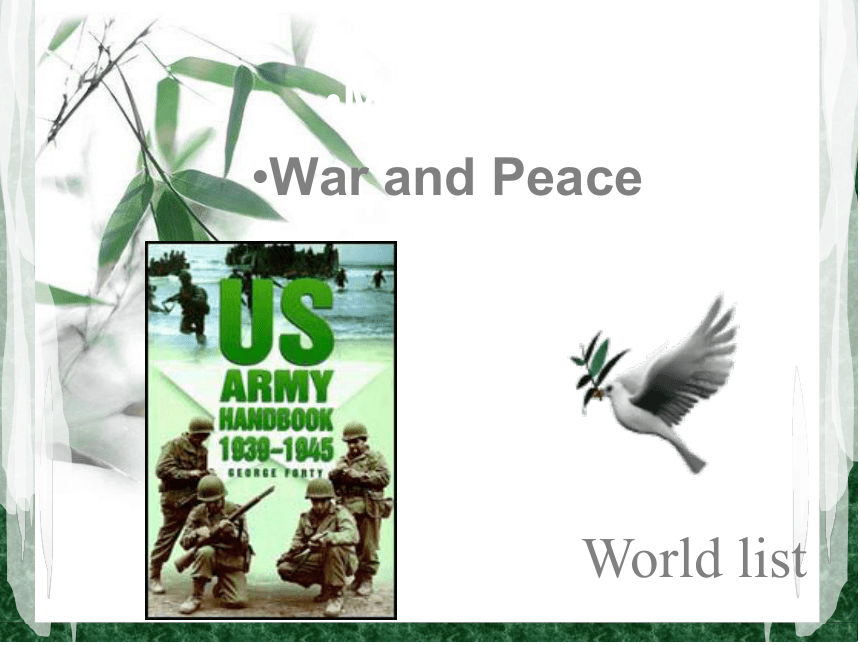 | |
| 格式 | zip | ||
| 文件大小 | 2.5MB | ||
| 资源类型 | 教案 | ||
| 版本资源 | 外研版 | ||
| 科目 | 英语 | ||
| 更新时间 | 2018-11-24 16:42:00 | ||
图片预览

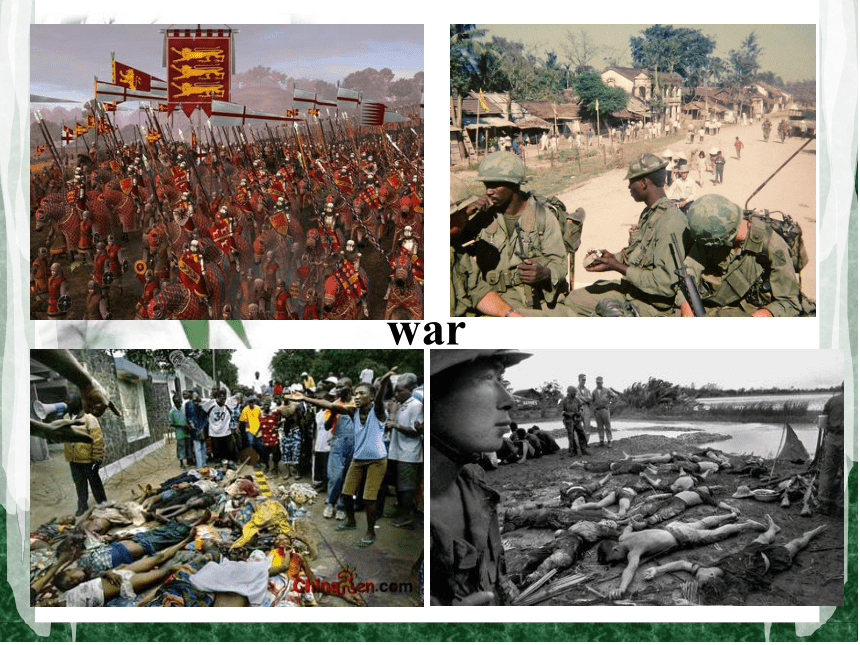
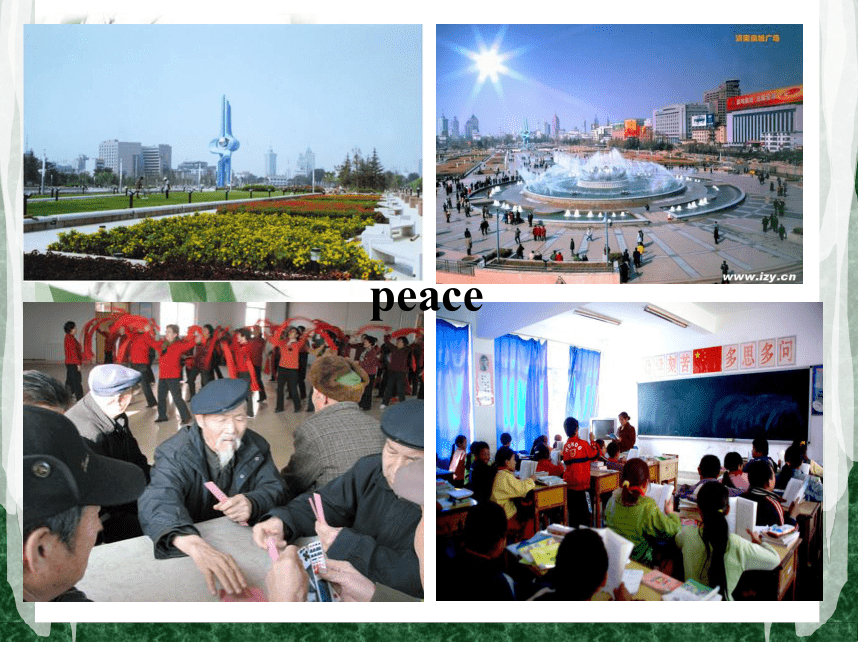
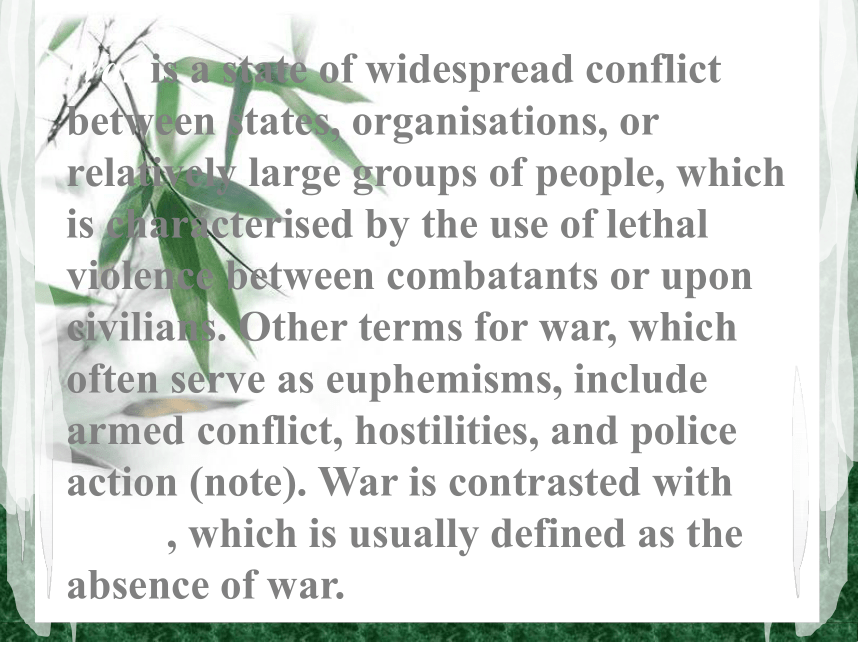
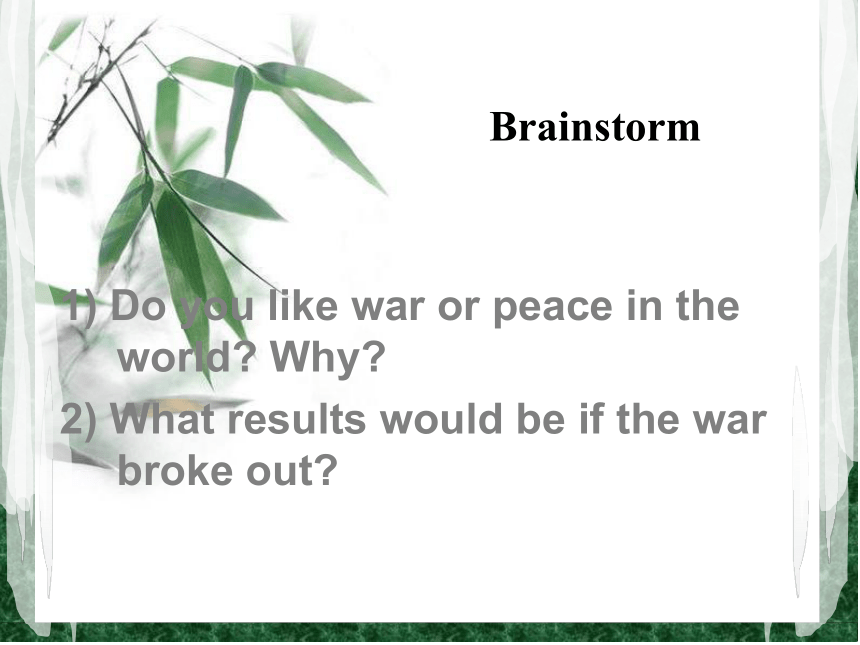
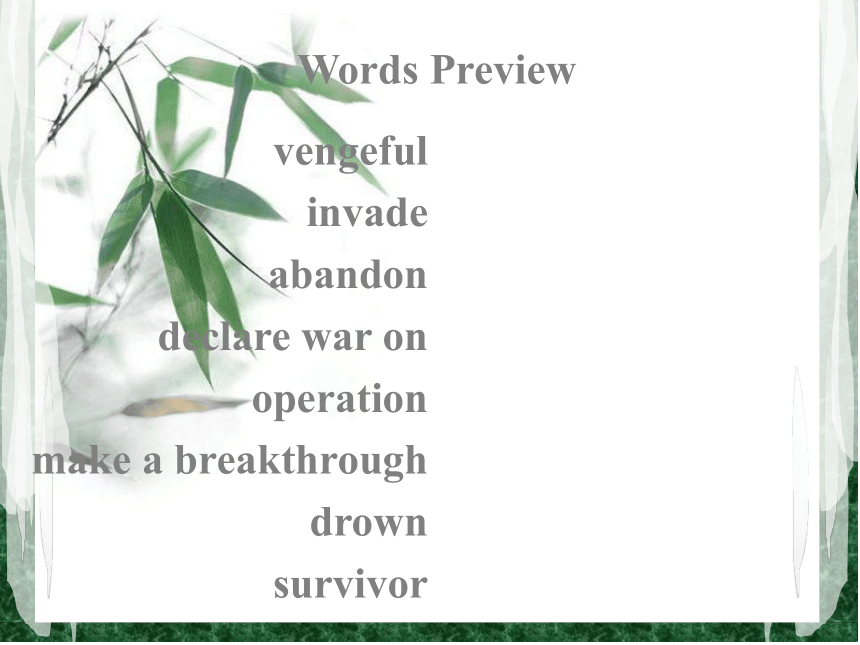
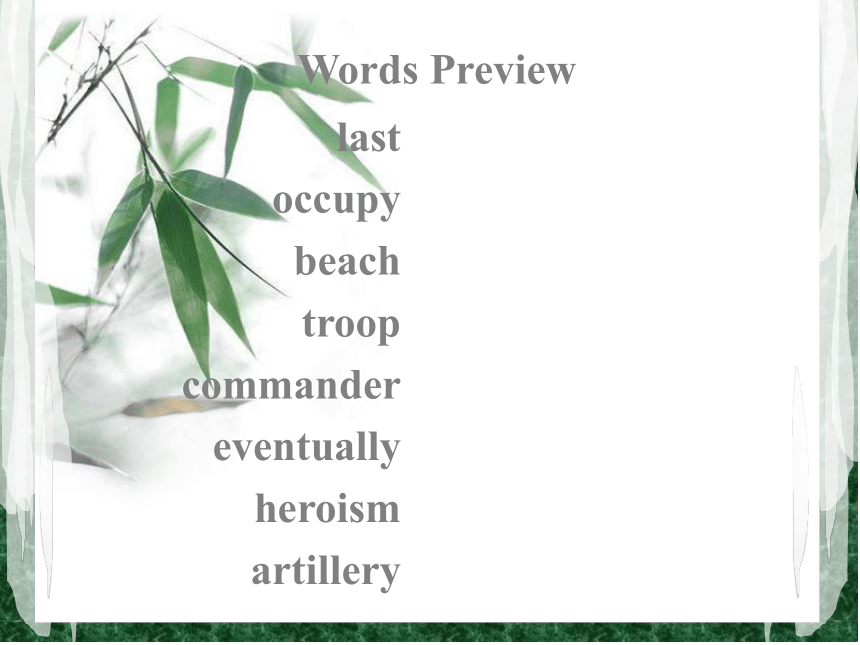


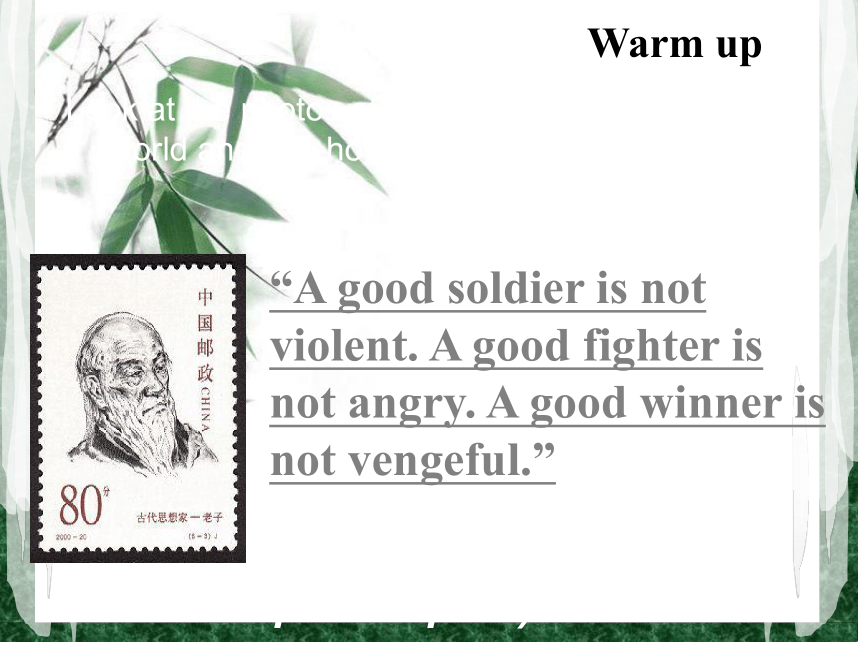
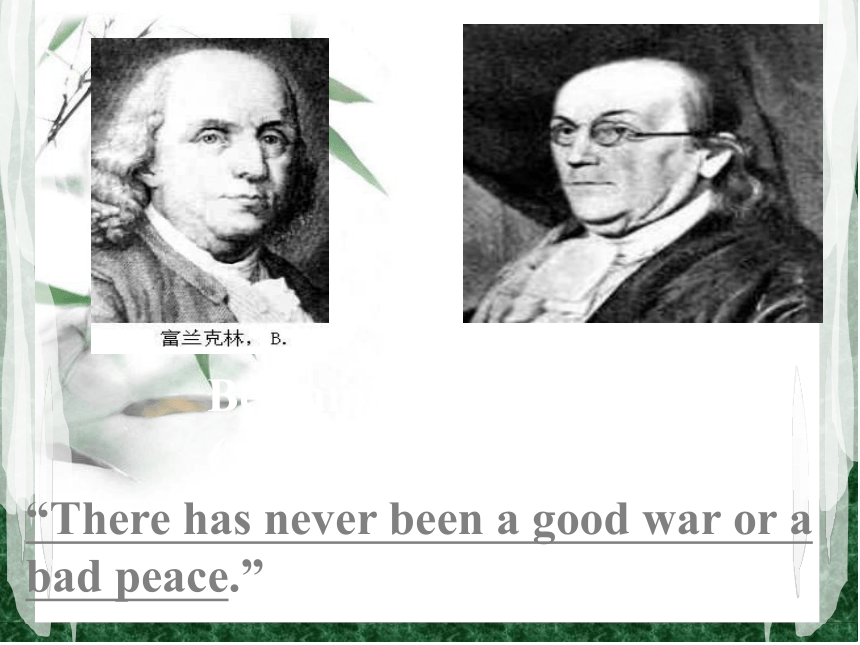
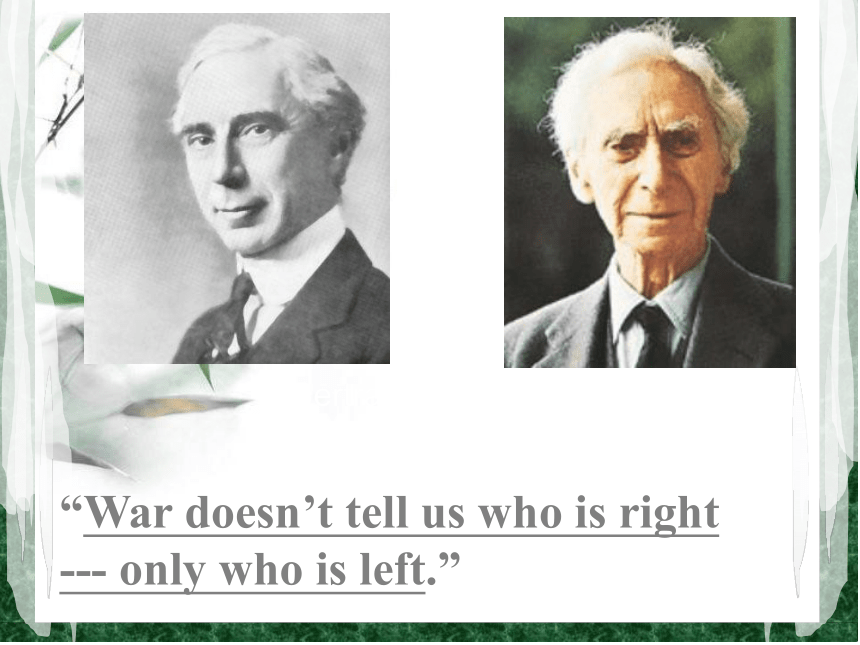
文档简介
课件56张PPT。Module 6
War and Peace?World listwarpeaceWar is a state of widespread conflict between states, organisations, or relatively large groups of people, which is characterised by the use of lethal violence between combatants or upon civilians. Other terms for war, which often serve as euphemisms, include armed conflict, hostilities, and police action (note). War is contrasted with peace, which is usually defined as the absence of war. 1) Do you like war or peace in the world? Why?
2) What results would be if the war broke out?BrainstormWords Previewvengeful
invade
abandon
declare war on
operation
make a breakthrough
drown
survivoradj.复仇的
v.入侵,侵略
v.放弃,抛弃
向……宣战
n.行动
取得重大突破
v.淹死,使溺死
n.幸存者last
occupy
beach
troop
commander
eventually
heroism
artilleryv.持续
v.占领
n.海滩
n.部队,士兵
n.指挥官
adv.最后,最终
n.英雄主义
n.大炮Words Previewshell
pick up
deep
wound
shocked
private
memorial
overlookn.炮弹
停下来让某人搭车
adj.深的
v.使受伤
adj.震惊的,惊骇的
n.兵,士兵
n.纪念碑
v.俯视,往下看Words Previewgrave
weary
condemn
war memorial
nationality
rescue
backpack
afterwardsn.墓,墓穴
v.使人疲倦,使人厌烦
v.责难,谴责
战争纪念碑
n.国籍
v.营救,拯救
n.背包
adv.后来Words PreviewLook at the photos of some famous people in the world and see how they thought of the war. Laozi (Chinese philosopher)“A good soldier is not violent. A good fighter is not angry. A good winner is not vengeful.”Warm up“There has never been a good war or a bad peace.”Benjamin Franklin
(American scientist)Bertrand Russell (British philosopher)“War doesn’t tell us who is right --- only who is left.”Albert Einstein
(German-born American theoretical physicist)“You cannot prevent and prepare for war at the same time.”“If everyone demanded peace
instead of another TV set, we’d have peace.”John Lennon
(British musician)4. A good soldier is not violent. A good fighter is not angry. A good winner is not vengeful2.There has never been a good
war or a bad peace.1. You can’t prevent and
prepare for war at the same time.3.War doesn’t tell us who is right --- only who is left.5. If everyone demanded peace instead of another TV set, we’d have peace.LaoziEinsteinFranklinLennonRussell1. Laozi: What do “vengeful” winners do?
They revenge themselves on the people they have beaten.
2. Benjamin Franklin: Do you agree that there can’t be a good war?
(Open)Discussion3. Bertrand Russell: Explain the meaning of the words right and left in the quotation.
right: a) on the right side
b) holding the right beliefs
left: a) on the left side
b) still alive4. Albert Einstein:
What can governments do to prevent war?
Not prepare for war.
5. John Lennon:
What does it mean if people demand peace?
a) They want peace.
b) They don’t want peace1. There was a war that took place between 1939 and 1945. What’s the name of this war?
a) the Great War b) the Second World War
2. When the war began, which countries were involved?
a) Britain and Germany
b) the United States and Japan
3. The war began when a country was invaded. Which country was invaded?
a) Poland b) France Vocabulary and Reading-- The D-Day LandingsLook at the photos and the map and get ready to talk about something about the war.-- The D-Day Landings1. What kind of people can you see in the photo?
Soldiers.
2. Where on the map do you think the photo was taken?
Approaching the French coast.
3. What are the people in the photo doing?
They are waiting to land on the French beaches.1. declare war on: to tell another country that you are going to start a war with them
2. military operation: a planned activity during a war
3. make a breakthrough: to be successful
4. drown: to die in water
5. survivors: people who are not killed in an accidentVocabularyabandon attempt danger kill1 British and American troops ________ to land in France.
2 These landings were very _________.
3 Many troops were ______during the landings.
4 At one point, military commanders thought about __________ the operation.attempteddangerouskilledabandoning1. The first passage is taken from___.
a) a history book b) a newspaper article
2. The second passage is _______.
a) a government report on the war
b) the history of a particular group of soldiers
3. The third passage refers to ______.
a) an event related to the war
b) an event before the war √√ √SkimmingMaterials The Second World War
1. Lasting years:
2. Start time:
3. End time:
4. Joining countries:
5. Cause:
6.The important battle:6 years ( from 1939– 1945)19391945US, Britain, Germany, CanadaBritain declared war on Germany after Germany invaded Poland.Operation OverlordEvent:
Ships(number):
Troops (number):
The most important
dangerous place:Operation Overlord started when boats full of soldiers landed on the beaches of Normandy in France.more than 5,000 crossed the English channel130,000 to the French
coast (in the ship)Omaha BeachD-Day LandingsCareful Reading1 What event started the Second World War?
Germany’s invasion of Poland.
2 What was the purpose of Operation Overlord?
To invade France.
3 What nationality were the troops who took part in the operation?
British, American and Canadian.Passage 14 Where was the most dangerous place to land?
Omaha Beach.
5 Was Operation Overlord successful?
Yes, it was.Omaha Beach cemetery 1. When the Germans started firing at the boats,_______.
(a) the boats were so far from the beach that they were not hit.
(b) the boats were one kilometer from the beach
2. When Boat 5 was hit by a shell,______.
(a) everyone was killed
(b) most of the men were rescued from the water√√Passage 23. The men from Boat 3 had problems in the water because______.
(a) their backpacks were too heavy
(b) the water was too deep
4. Six men tried to climb up the cliff and __.
(a) some of them managed to reach the top
(b) all of them reached the top
5. Two of the soldiers from Able Company__.
(a) stayed on the beach
(b) met some other soldiers√√√1. Why was 6 June 2004 an important date for the survivors?
It was the 60th anniversary of the landings.
2. Why do you think so many soldiers were never found?
They were drowned or blown up.
3. In your own words, what does the poem say about the lost soldiers?
It says that they are not really lost because we will always remember them.Passage 31. What do you think of the Second World War? Is it good or bad? Why?
2. Was “D-Day Landings” a war of justice (公平)or evil (邪恶)?DiscussionAfter ReadingThe D -Day Landings The 1st passage danger and braveryOperation Overlord in 1944the D-Day landingsUS, Britain, CanadaDangerous, soldiers killedat Omaha BeachThe 2nd passage The 3rd passage crossing on morning of 6 June 1944soldiers disappearing under watersoldiers drownedsurvivors up to get off the beachOn 6 June 2004, survivors returningcemetery and memorial overlookinga poem called "For the Fallen"the poem seen on war memorialsGeneral Eisenhower gives the order of the day "Full victory - Nothing else" to paratroopers in England just before they board airplanes in the first D-Day assault.D-Day LandingsAmerican soldiers wading through water into Nazi machine-gun fire on the coast of France. American troops invading Normandy.At Utah Beach, members of an American landing party helped others whose landing craft was sunk by the Germans off the coast of France. The survivors reached Utah Beach, near Cherbourg, by using a life raft.Crossed rifles in the sand placed as a tribute to this fallen soldier.Medics help an injured American soldier.American assault troops of the 16th Infantry Regiment, injured while storming Omaha Beach, wait by the Chalk Cliffs for evacuation to a field hospital for further medical treatment. Collville-sur-Mer, Normandy.Language Points1 The situation at Omaha Beach was so bad that the US army commanders thought about abandoning the invasion.
奥马哈海滩的形势很糟,美军将军甚至考虑放弃攻击。
句中so…that引导结果状语从句。由“so … that” 和 “such… that” 引导的结果状语可以看作程度状语,它表示主句的动作或状态达到某种程度而引起的结果。1) 汤姆起身太匆忙,结果把茶杯撞到了桌下。
Tom got up from the table so quickly that he knocked the cup off.
2) 简平易近人,容易相处。
Jane is so easy-going that we feel at ease with her.
3) 这个问题很简单,我们中每个人都能答上来。
It was so easy a question that every one of us could answer it. (= It was such an easy question that every one of us could answer it. 2 Eventually, the soldiers made a breakthrough and the D-Day landings were successful.
最后,战士攻了上去,D-日登陆成功了。
句中make a breakthrough 是由make构成的短语动词,看成不及物动词。3 If they had reached the beach, they would probably have been killed.
他们当时抵达了海滩,可能早就没命了。
本句是“针对过去的虚拟语气”,其形式是:If + 主语 + had +过去完成式动词 + …… +主句:主语 + would (should, could, might) + have +过去完成式动词 +……。1) If you had studied harder last term, you could have passed the exam. (从句动词用had studied, 主句动词用have passed)
如果你在上个学期用功一些,你就会在考试中过关了。
2) If you had taken my advice, you wouldn’t have failed in the exam. (从句动词用had taken, 主句动词用have failed)
如果你当时听从我的劝告的话,你就不会在考试中失败了。3) If you had got up earlier, you could have caught the train. (从句动词用had got up, 主句动词用 have caught)
如果你起床早一点,你就会赶得上火车了。
4) If it had snowed, I would have skied in the park. (从句动词用had snowed, 主句动词用 have skied)
如果下雪的话,我就可在公园里滑雪了。
注意:如果动作在进行中,主句要用:"I主语 + would + have + 完成进行式动词+……。5) If they had been here, he would have been speaking to them.
(从句动词用had been, 主句动词用 have been speaking)4 Many of the men were either killed or wounded by machine gun fire.
机关枪下,许多人或者牺牲或者挂彩。
either or 是表示选择的并列连词。表示选择的并列结构
1) or意思为“否则”。I must work hard, or I’ll fail in the exam.
2) either…or意思为“或者……或者……”。
注意谓语动词采用就近原则。Either you or I am right.5 The cemetery and memorial are situated on a cliff overlooking the beach and the English Channel, from where the boats attempted their landings.
墓地和纪念碑坐落在悬崖上,俯瞰海滩和英吉利海峡,战船就是从那里登陆的。
from where为“介词+关系副词“结构,可以引导定语从句。
例如:We stood at the top of the hill, from where we can see the town. 像listen to, look at, depend on, pay attention to, take care of 等固定短语动词,在定语从句中一般不宜将介词与动词分开。
例如:This is the boy whom she has taken care of. 1 今天很冷,他决定呆在家里。
It was so cold a day (such a cold day) that he decided to stay at home.
2 噩梦使她非常害怕,她再也睡不着了。
The nightmare so frightened her that she could not go to sleep again.
3 科学家们力争在癌症研究方面有个突破。
The scientists strive for a breakthrough in cancer research. 翻译句子Thank you!
War and Peace?World listwarpeaceWar is a state of widespread conflict between states, organisations, or relatively large groups of people, which is characterised by the use of lethal violence between combatants or upon civilians. Other terms for war, which often serve as euphemisms, include armed conflict, hostilities, and police action (note). War is contrasted with peace, which is usually defined as the absence of war. 1) Do you like war or peace in the world? Why?
2) What results would be if the war broke out?BrainstormWords Previewvengeful
invade
abandon
declare war on
operation
make a breakthrough
drown
survivoradj.复仇的
v.入侵,侵略
v.放弃,抛弃
向……宣战
n.行动
取得重大突破
v.淹死,使溺死
n.幸存者last
occupy
beach
troop
commander
eventually
heroism
artilleryv.持续
v.占领
n.海滩
n.部队,士兵
n.指挥官
adv.最后,最终
n.英雄主义
n.大炮Words Previewshell
pick up
deep
wound
shocked
private
memorial
overlookn.炮弹
停下来让某人搭车
adj.深的
v.使受伤
adj.震惊的,惊骇的
n.兵,士兵
n.纪念碑
v.俯视,往下看Words Previewgrave
weary
condemn
war memorial
nationality
rescue
backpack
afterwardsn.墓,墓穴
v.使人疲倦,使人厌烦
v.责难,谴责
战争纪念碑
n.国籍
v.营救,拯救
n.背包
adv.后来Words PreviewLook at the photos of some famous people in the world and see how they thought of the war. Laozi (Chinese philosopher)“A good soldier is not violent. A good fighter is not angry. A good winner is not vengeful.”Warm up“There has never been a good war or a bad peace.”Benjamin Franklin
(American scientist)Bertrand Russell (British philosopher)“War doesn’t tell us who is right --- only who is left.”Albert Einstein
(German-born American theoretical physicist)“You cannot prevent and prepare for war at the same time.”“If everyone demanded peace
instead of another TV set, we’d have peace.”John Lennon
(British musician)4. A good soldier is not violent. A good fighter is not angry. A good winner is not vengeful2.There has never been a good
war or a bad peace.1. You can’t prevent and
prepare for war at the same time.3.War doesn’t tell us who is right --- only who is left.5. If everyone demanded peace instead of another TV set, we’d have peace.LaoziEinsteinFranklinLennonRussell1. Laozi: What do “vengeful” winners do?
They revenge themselves on the people they have beaten.
2. Benjamin Franklin: Do you agree that there can’t be a good war?
(Open)Discussion3. Bertrand Russell: Explain the meaning of the words right and left in the quotation.
right: a) on the right side
b) holding the right beliefs
left: a) on the left side
b) still alive4. Albert Einstein:
What can governments do to prevent war?
Not prepare for war.
5. John Lennon:
What does it mean if people demand peace?
a) They want peace.
b) They don’t want peace1. There was a war that took place between 1939 and 1945. What’s the name of this war?
a) the Great War b) the Second World War
2. When the war began, which countries were involved?
a) Britain and Germany
b) the United States and Japan
3. The war began when a country was invaded. Which country was invaded?
a) Poland b) France Vocabulary and Reading-- The D-Day LandingsLook at the photos and the map and get ready to talk about something about the war.-- The D-Day Landings1. What kind of people can you see in the photo?
Soldiers.
2. Where on the map do you think the photo was taken?
Approaching the French coast.
3. What are the people in the photo doing?
They are waiting to land on the French beaches.1. declare war on: to tell another country that you are going to start a war with them
2. military operation: a planned activity during a war
3. make a breakthrough: to be successful
4. drown: to die in water
5. survivors: people who are not killed in an accidentVocabularyabandon attempt danger kill1 British and American troops ________ to land in France.
2 These landings were very _________.
3 Many troops were ______during the landings.
4 At one point, military commanders thought about __________ the operation.attempteddangerouskilledabandoning1. The first passage is taken from___.
a) a history book b) a newspaper article
2. The second passage is _______.
a) a government report on the war
b) the history of a particular group of soldiers
3. The third passage refers to ______.
a) an event related to the war
b) an event before the war √√ √SkimmingMaterials The Second World War
1. Lasting years:
2. Start time:
3. End time:
4. Joining countries:
5. Cause:
6.The important battle:6 years ( from 1939– 1945)19391945US, Britain, Germany, CanadaBritain declared war on Germany after Germany invaded Poland.Operation OverlordEvent:
Ships(number):
Troops (number):
The most important
dangerous place:Operation Overlord started when boats full of soldiers landed on the beaches of Normandy in France.more than 5,000 crossed the English channel130,000 to the French
coast (in the ship)Omaha BeachD-Day LandingsCareful Reading1 What event started the Second World War?
Germany’s invasion of Poland.
2 What was the purpose of Operation Overlord?
To invade France.
3 What nationality were the troops who took part in the operation?
British, American and Canadian.Passage 14 Where was the most dangerous place to land?
Omaha Beach.
5 Was Operation Overlord successful?
Yes, it was.Omaha Beach cemetery 1. When the Germans started firing at the boats,_______.
(a) the boats were so far from the beach that they were not hit.
(b) the boats were one kilometer from the beach
2. When Boat 5 was hit by a shell,______.
(a) everyone was killed
(b) most of the men were rescued from the water√√Passage 23. The men from Boat 3 had problems in the water because______.
(a) their backpacks were too heavy
(b) the water was too deep
4. Six men tried to climb up the cliff and __.
(a) some of them managed to reach the top
(b) all of them reached the top
5. Two of the soldiers from Able Company__.
(a) stayed on the beach
(b) met some other soldiers√√√1. Why was 6 June 2004 an important date for the survivors?
It was the 60th anniversary of the landings.
2. Why do you think so many soldiers were never found?
They were drowned or blown up.
3. In your own words, what does the poem say about the lost soldiers?
It says that they are not really lost because we will always remember them.Passage 31. What do you think of the Second World War? Is it good or bad? Why?
2. Was “D-Day Landings” a war of justice (公平)or evil (邪恶)?DiscussionAfter ReadingThe D -Day Landings The 1st passage danger and braveryOperation Overlord in 1944the D-Day landingsUS, Britain, CanadaDangerous, soldiers killedat Omaha BeachThe 2nd passage The 3rd passage crossing on morning of 6 June 1944soldiers disappearing under watersoldiers drownedsurvivors up to get off the beachOn 6 June 2004, survivors returningcemetery and memorial overlookinga poem called "For the Fallen"the poem seen on war memorialsGeneral Eisenhower gives the order of the day "Full victory - Nothing else" to paratroopers in England just before they board airplanes in the first D-Day assault.D-Day LandingsAmerican soldiers wading through water into Nazi machine-gun fire on the coast of France. American troops invading Normandy.At Utah Beach, members of an American landing party helped others whose landing craft was sunk by the Germans off the coast of France. The survivors reached Utah Beach, near Cherbourg, by using a life raft.Crossed rifles in the sand placed as a tribute to this fallen soldier.Medics help an injured American soldier.American assault troops of the 16th Infantry Regiment, injured while storming Omaha Beach, wait by the Chalk Cliffs for evacuation to a field hospital for further medical treatment. Collville-sur-Mer, Normandy.Language Points1 The situation at Omaha Beach was so bad that the US army commanders thought about abandoning the invasion.
奥马哈海滩的形势很糟,美军将军甚至考虑放弃攻击。
句中so…that引导结果状语从句。由“so … that” 和 “such… that” 引导的结果状语可以看作程度状语,它表示主句的动作或状态达到某种程度而引起的结果。1) 汤姆起身太匆忙,结果把茶杯撞到了桌下。
Tom got up from the table so quickly that he knocked the cup off.
2) 简平易近人,容易相处。
Jane is so easy-going that we feel at ease with her.
3) 这个问题很简单,我们中每个人都能答上来。
It was so easy a question that every one of us could answer it. (= It was such an easy question that every one of us could answer it. 2 Eventually, the soldiers made a breakthrough and the D-Day landings were successful.
最后,战士攻了上去,D-日登陆成功了。
句中make a breakthrough 是由make构成的短语动词,看成不及物动词。3 If they had reached the beach, they would probably have been killed.
他们当时抵达了海滩,可能早就没命了。
本句是“针对过去的虚拟语气”,其形式是:If + 主语 + had +过去完成式动词 + …… +主句:主语 + would (should, could, might) + have +过去完成式动词 +……。1) If you had studied harder last term, you could have passed the exam. (从句动词用had studied, 主句动词用have passed)
如果你在上个学期用功一些,你就会在考试中过关了。
2) If you had taken my advice, you wouldn’t have failed in the exam. (从句动词用had taken, 主句动词用have failed)
如果你当时听从我的劝告的话,你就不会在考试中失败了。3) If you had got up earlier, you could have caught the train. (从句动词用had got up, 主句动词用 have caught)
如果你起床早一点,你就会赶得上火车了。
4) If it had snowed, I would have skied in the park. (从句动词用had snowed, 主句动词用 have skied)
如果下雪的话,我就可在公园里滑雪了。
注意:如果动作在进行中,主句要用:"I主语 + would + have + 完成进行式动词+……。5) If they had been here, he would have been speaking to them.
(从句动词用had been, 主句动词用 have been speaking)4 Many of the men were either killed or wounded by machine gun fire.
机关枪下,许多人或者牺牲或者挂彩。
either or 是表示选择的并列连词。表示选择的并列结构
1) or意思为“否则”。I must work hard, or I’ll fail in the exam.
2) either…or意思为“或者……或者……”。
注意谓语动词采用就近原则。Either you or I am right.5 The cemetery and memorial are situated on a cliff overlooking the beach and the English Channel, from where the boats attempted their landings.
墓地和纪念碑坐落在悬崖上,俯瞰海滩和英吉利海峡,战船就是从那里登陆的。
from where为“介词+关系副词“结构,可以引导定语从句。
例如:We stood at the top of the hill, from where we can see the town. 像listen to, look at, depend on, pay attention to, take care of 等固定短语动词,在定语从句中一般不宜将介词与动词分开。
例如:This is the boy whom she has taken care of. 1 今天很冷,他决定呆在家里。
It was so cold a day (such a cold day) that he decided to stay at home.
2 噩梦使她非常害怕,她再也睡不着了。
The nightmare so frightened her that she could not go to sleep again.
3 科学家们力争在癌症研究方面有个突破。
The scientists strive for a breakthrough in cancer research. 翻译句子Thank you!
